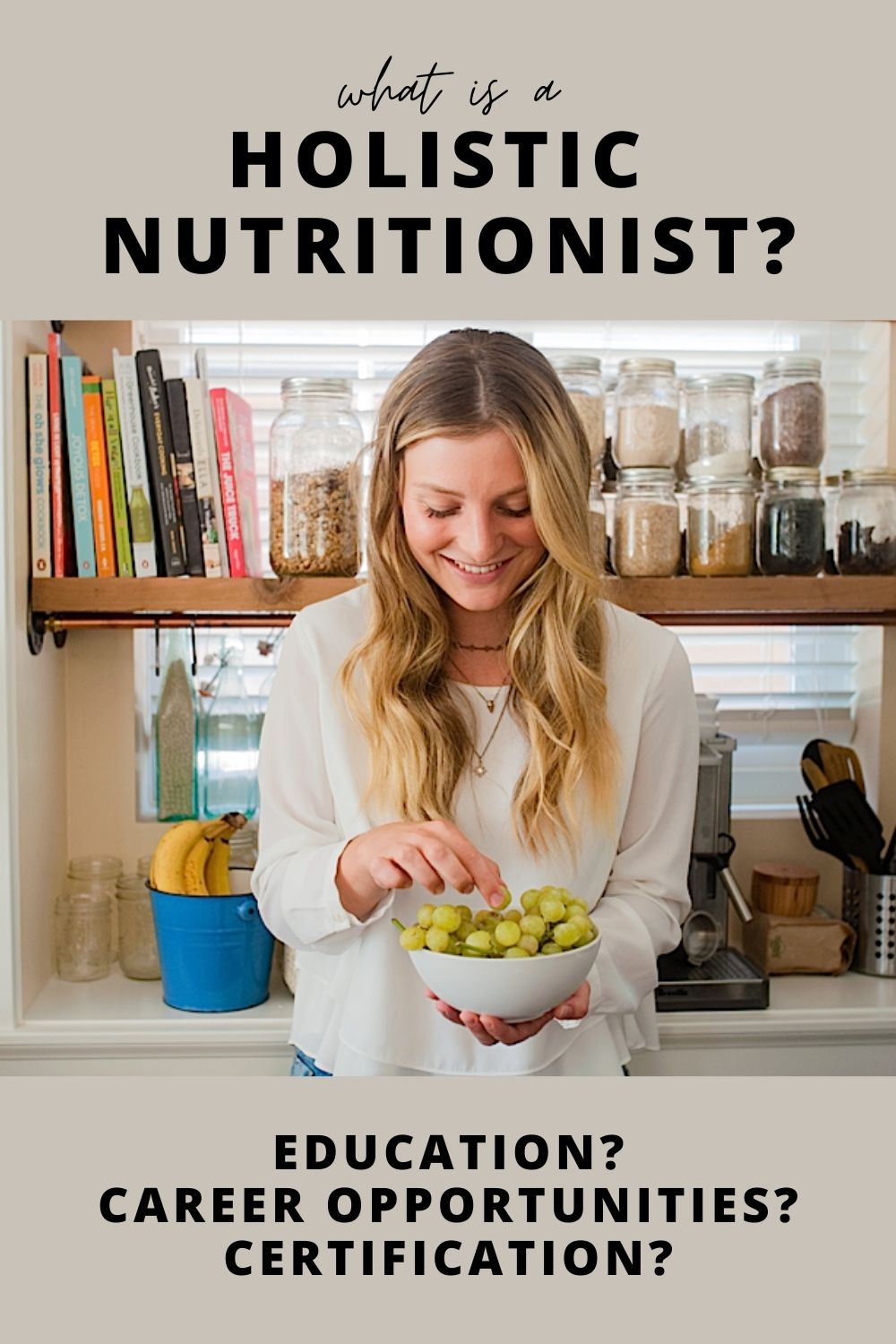SHARE
You may have heard of a Holistic Nutritionist before, but you’re curious to know more. What do we do? Where do we go to school? Today I’m answering one of the most commonly asked questions from you guys – what is a holistic nutritionist?
This blog post is in partnership with The Canadian School of Natural Nutrition, where I studied to become an R.H.N. All opinions are my own. Thank you to CSNN for sponsoring this post and truly changing my life forever!!
What is an R.H.N.?
To start, it’s important to know that Holistic Nutritionists fall under various designations, depending on each province. R.H.N., C.H.N., C.H.N.C are all various designations you might see throughout Canada.
For example, R.H.N. (Registered Holistic Nutritionist) is used in B.C., while C.H.N. (Certified Holistic Nutritionist) is used in Alberta. You can find more information on designation in your province in this post here.
It’s important to my clients to work with a Holistic Nutritionist with a proper designation, showcasing that I have done the proper schooling to educate and support them on their health journeys. These designations show that the practitioner has studied at CSNN (The Canadian School of Natural Nutrition) in Canada.
What is the best holistic nutrition school?
While there are various programs around the world where you can study natural or holistic nutrition, I attended CSNN in Canada and will be sharing about my experience there.
I took the 1-year, full-time, in-person Natural Nutrition Diploma Program at the Vancouver campus.
I loved my studies at CSNN and truly enjoyed every moment of my time there. Prior to choosing this school, I did a ton of research. What appealed to me most was:
- the flexible schedule (offering part-time or full-time schooling, various schedules depending on your personal or work life, etc.)
- the evidence-based and science-based take on nutrition
- in-house cooking classes (where we learned how to prepare things like fermented foods, how to cook with superfoods, knife skills and more)
- students are challenged to a final board exam at the end of the year
- students are given the opportunity and challenge to work on case study clients to help prepare them for their own practice
- the in-depth intensive course schedule, perfect for deep-diving into one subject at a time
Below is an example of the courses offered at CSNN:
- Nutritional Symptomatology
- Anatomy & Physiology
- Hormone Health
- Fundamentals of Business
- Biochemistry & Epigenetics
- Lifecycle Nutrition – Sports
For those interested in studying to become a holistic practitioner, I took the Natural Nutrition diploma program at The Canadian School of Natural Nutrition and found all of the classes interesting, challenging and rewarding. With the updated curriculum, the school offers business strategies to help you get properly set up in your career path. The teachers were honestly SO incredible, relatable and helpful. They made my experience that much more incredible.
Take online nutrition courses from the comfort of your home
While I definitely enjoyed an in-person experience at CSNN, I wouldn’t let a long commute hold you back from studying! I honestly think now is a perfect time to focus on your own health and education, because we have more access to online schooling than ever before.
With multiple classroom locations across Canada, CSNN has now added 100% virtual interactive classroom options. Their online distance education branch allows you to study from anywhere with your computer so you can be flexible and comfortable. I recommend the Natural Nutrition Program but they also offer the following virtually right now (at select locations): Healthy Eating & Lifestyle Certificate, Holistic Culinary Certificate, and Introduction to Natural Nutrition Certificate.

Why is holistic nutrition important?
I found it important to study nutrition from a holistic perspective because I love how CSNN incorporated mind, body and spirit into the curriculum. We learned how to look at root issues instead of “band-aid fixes” by focusing on lifestyle, mindfulness, supplements and of course, diet.
When working with a holistic practitioner, my clients tell me they see greater results in all areas of their life, instead of just diet. This helps clients make long-lasting changes and is honestly so rewarding in the long run.
Can holistic nutrition help with health issues?
The best part about studying nutrition, is that you don’t even have to want a career in nutrition if you don’t want to! Many of the students I studied with attended the school for nutrition education for their children, families or out of personal interest. I truly believe everybody can benefit from nutrition schooling.
Studying holistic nutrition at CSNN helped me with my own personal health issues, such as:
- Digestion & bloating: targeting the imbalance responsible for my discomfort and how to create my own gut-health protocol.
- Parasites & yeast overgrowth and how to properly cleanse from them
- Acne and skin issues – how to find out the root cause and natural alternatives to harsh medication/methods.
- How to find balance but also create my own opinion about which diet is the best diet for myself & my individual needs.
- Energy and deficiencies: I learned how to naturally increase my iron levels and integrate the right foods & supplements.
- Hormonal imbalances: options for natural birth control planning, how to support my hormones, how to support my body while coming off The Pill and so much more.
While studying at CSNN, I never felt judged or alone while on my own health journey. Many of the students also go through their own health struggles and I felt incredibly supported during my entire schooling and beyond. The teachers were incredible and I always felt heard and guided.
While studying at CSNN, I also learned how to put together healthy, balanced meals. With the combination of the cooking classes and class sessions, I slowly began to grow the recipes on my website and grow as a food blogger & recipe developer, working alongside popular brands like Bobs Red Mill, Nutiva, Breville and more. This is a popular route that many Holistic Nutritionists take – working on recipe development for brands, restaurants & cafes, food blogs, retreat menus and more.
How do Holistic Nutritionists make money?
While you can do many things with your designation, there are some popular career paths that most of us go towards. I truly think the world needs more Holistic Nutritionists and I am so proud to be doing the work that I am doing.
Some examples of CSNN grads and their work:
Sisley Killam (that’s me!): one-on-one coaching through The Acne Solution Program and The Acne Protocol, workshop & retreat work, recipe development & brand collaborations
Joy McCarthy: Founder of Joyous Health, an award-winning Certified Holistic Nutritionist and best-selling author of The Joyous Cookbook, Joyous Detox and Joyous Health
Meghan De Jong: R.H.N. Anxiety Nutritionist and Regenerative Gardener
Chara Marie: R.H.N., Almost 30 Podcast Community Manager, founder of Oat of the Ordinary
Roslyn Kent: R.H.N., founder of The Plant-Powered Gut Academy
Lauren Paton: R.H.N., Holistic Chef and Corporate Nutritionist
Jordan Bruce: R.H.N. specializing in gut and hormone health
Rhiannon Lytle: R.H.N. at Integrative Naturopathic Clinic, Co-Host of The Enhanced Life Podcast, Social & Community Support and Educator at Organika.
Many people ask me if becoming a Holistic Nutritionist pays well. This completely depends on how much effort you put into either finding a job or starting your own business. You have endless possibilities for work as an R.H.N., so it’s up to you to choose your career path after you’ve graduated. Do you want to work with clients? Do you want to work in a clinic? Are you interested in creating a product? I personally love working for myself and having the flexibility to grow and expand my business to suit my lifestyle.
How to grow your nutrition business after graduating
While CSNN offers wonderful new business courses within the program, I know how it can feel stressful post-grad! The best part about the holistic nutrition community is that the support is phenomenal.
I feel so grateful to have access to Facebook support groups, networks and friends from school to support my business journey. There are few important steps that I took post-grad to feel supported and excited to work with clients:
- Started to slowly build my online presence while I was in school so that I could earn my readers’ and clients’ trust.
- Attended workshops and events in my community to support my business journey.
- Created a timeline and scheduled plan for my business to create structure & attainable goals.
- Trusted myself. I didn’t let negative self-talk get in the way. CSNN sets you up to feel confident in supporting clients. And after the course (and a final exam!) you’ll feel so ready to begin working as a Holistic Nutritionist.
- My biggest tip: just start! The best way to get 100% comfortable in your coaching is from practice. You got this!
If you’ve been thinking about studying to become a Holistic Nutritionist, I hope you learned something new and feel inspired to check out CSNN.


Is it possible to convert from a Canadian designation to European?
I don’t think so! But you’ll have to check with the school itself :)